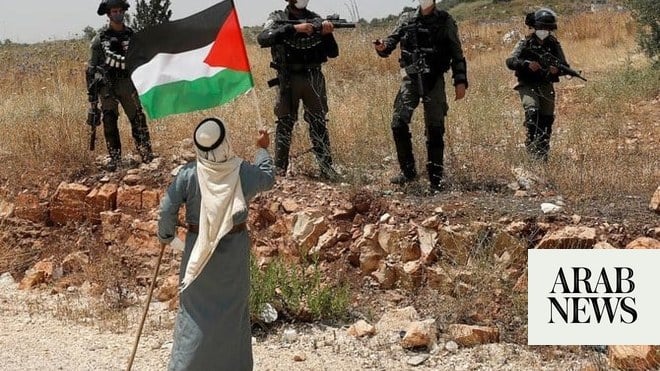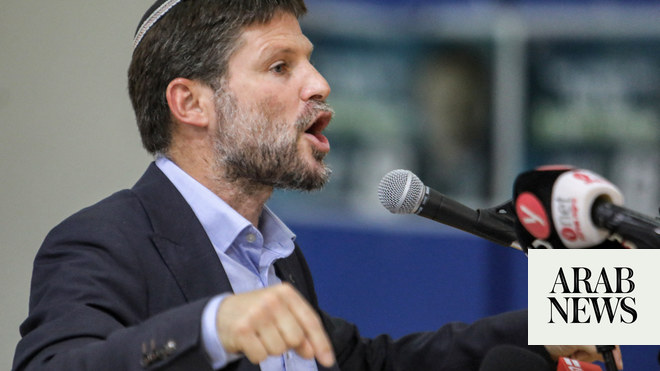
The amount to be deducted is double the amount normally confiscated monthly
This is not the first time that Israeli authorities have confiscated Palestinian tax revenues as “compensation” to the families of Israelis
RAMALLAH: Israel, which collects taxes on behalf of the Palestinian Authority, would use 100 million shekels ($29 million) from PA funds to compensate victims of Palestinian attacks, Israeli Finance Minister Bezalel Smotrich has said.
The amount to be deducted is double the amount normally confiscated monthly — $14.7 million — in the first such move since Smotrich took office.
Smotrich signed off orders, claiming these funds would normally be transferred by the PA to the families of prisoners and those carrying out attacks against the occupation.
This is not the first time that Israeli authorities have confiscated Palestinian tax revenues as “compensation” to the families of Israelis killed and injured in Palestinian operations.
On Jan. 8, Smotrich ordered the seizure of $40.5 million from the PA’s funds as part of the sanctions he decided to impose on the Palestinians.
The sums deducted by Israel between 2011 and 2021 under this clause reached $11 billion.
In 2022 alone, the total unilateral Israeli deductions from Palestinian tax revenues amounted to $450 million.
A senior PA economic official, who preferred anonymity, told Arab News that the Israeli decision to double the deductions would exacerbate the financial crisis the PA has been suffering from for over a year.
“This is a deliberate attempt to weaken and undermine the Palestinian Authority,” he said.
“Considering the rise in prices and the increase in financial obligations for public sector employees, the additional deductions will make the PA unable to even pay 80 percent of the monthly salary to its employees, which will weaken the security establishment and push people to support violence against Israel,” he added.
The authority, he said, had exceeded the limit allowed to borrow from the Palestinian banks, and it was concerned that if it continued to borrow, it would cause a shock to the Palestinian banking sector.
Ahmed Majdalani, Palestinian social development minister, told Arab News that the additional Israeli cuts would impact the private sector as well as the Palestinian government’s ability to pay salaries and provide welfare for impoverished Palestinian families.
“Israel is pushing the PA to the brink of inability to fulfill its obligations, which aggravates the Palestinian situation and weakens PA institutions, including the security services,” he said.
Meanwhile, Israeli forces have arrested 27 Palestinians from the West Bank, most of them from Ramallah, transferred five Jerusalemites to administrative detention for three to six months, and demolished two houses in Duma village, south of Nablus, in the northern West Bank.
Suleiman Dawabsha, the head of the Duma village council, told Arab News that large forces from the Israeli army, accompanied by a military bulldozer, stormed the eastern area of the village and demolished the homes.
At the same time, the houses of 15 more people were threatened with demolition.
In a separate incident, an Israeli settler attacked a child from Hawara, south of Nablus, with pepper spray.
The settler stopped Suleiman Al-Mukhtar’s vehicle on the main street in the town and shot pepper spray through the car window at the face of his 14-year-old son, Faisal.
The Wall and Settlement Resistance Commission said the month of January saw 150 attacks carried out by settlers against Palestinians, including an attempt to establish six new settlement outposts. It added that 72 attacks were carried out in Nablus.
Meanwhile, 160 Palestinian and American human rights and humanitarian organizations have called on the US Congress to stop funding the “massacres” committed by the Israeli government against the Palestinian people.
They stressed the need for Congress to take immediate political measures to stop arming Israel by ending its military funding.
Amnesty International has called on Israeli authorities to dismantle the “apartheid” system, which is upheld by “unlawful killings” that constitute “crimes against humanity.”
It also condemned other grave and ongoing violations committed by Israeli authorities, such as administrative detention and forcible transfer of detainees.
In its statement, the organization said Israeli authorities controlled virtually every aspect of the lives of Palestinians, “subjecting them to oppression and unfair discrimination daily through the fragmentation of regions and legal segregation.”
People in the occupied Palestinian territories are isolated in enclaves, with those living in the Gaza Strip cut off from the rest of the world by Israel’s illegal blockade, which has caused a humanitarian crisis, a form of collective punishment, Amnesty said.
Elsewhere, Hamas condemned the opening of the Chadian Embassy in Israel on Thursday, calling on Chad to review its decision, which contradicts the position of the country’s people, who have historically supported Palestine.
Separately, the Islamic-Christian Organization for the Support of Jerusalem and Sanctities denounced an attack by settlers on a church in the Old City of Jerusalem.
It described the vandalism of the church as “a dangerous transgression by the settlers toward everything that is not Jewish in Jerusalem.”
The Israeli police said the culprit was an American tourist in his 40s who has been arrested.
Press reports said US Secretary of State Antony Blinken, during his visit, pressured Palestinian President Mahmoud Abbas to accept a security plan formulated by US Security Coordinator Gen. Michael Wenzel to restore the authority’s control over the cities of Nablus and Jenin, which have become centers of unrest.
The plan includes training a special Palestinian force to confront militants in the occupied West Bank.
“Such a security plan will never succeed because it has nothing to do with reality. The security problem in both Jenin and Nablus is not limited to suppressing those who resist Israel,” Jenin Gov. Maj. Gen. Akram Rajoub told Arab News.









